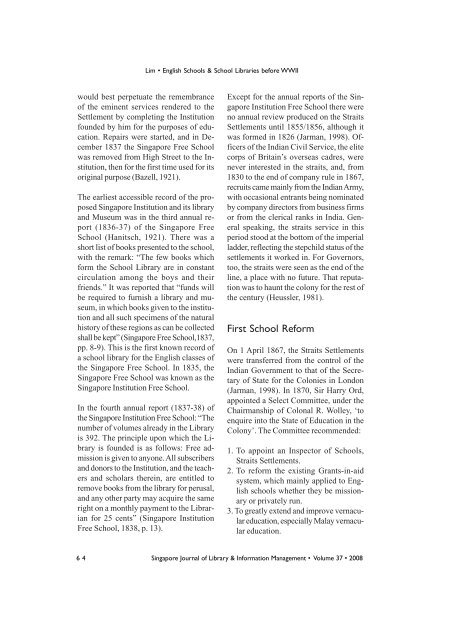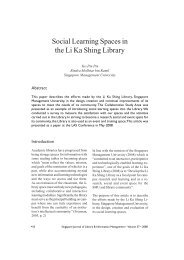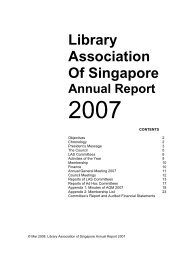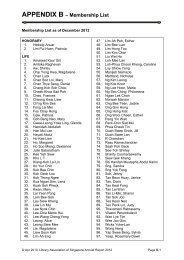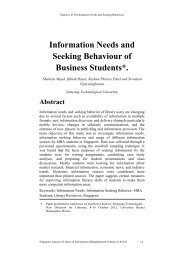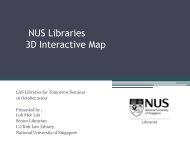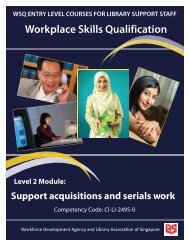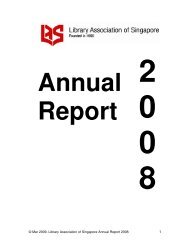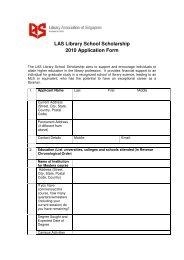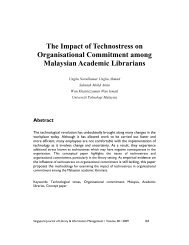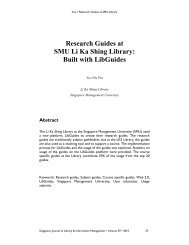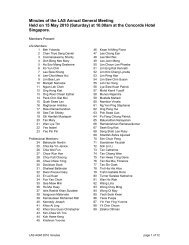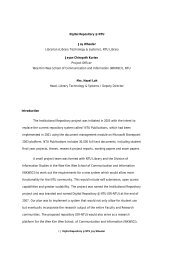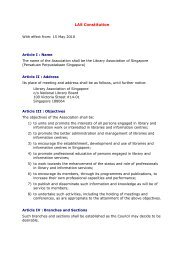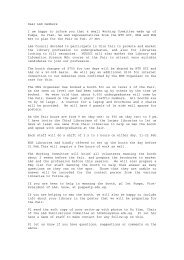English Schools and School - Library Association of Singapore
English Schools and School - Library Association of Singapore
English Schools and School - Library Association of Singapore
You also want an ePaper? Increase the reach of your titles
YUMPU automatically turns print PDFs into web optimized ePapers that Google loves.
Lim • <strong>English</strong> <strong><strong>School</strong>s</strong> & <strong>School</strong> Libraries before WWII<br />
would best perpetuate the remembrance<br />
<strong>of</strong> the eminent services rendered to the<br />
Settlement by completing the Institution<br />
founded by him for the purposes <strong>of</strong> education.<br />
Repairs were started, <strong>and</strong> in December<br />
1837 the <strong>Singapore</strong> Free <strong>School</strong><br />
was removed from High Street to the Institution,<br />
then for the first time used for its<br />
original purpose (Bazell, 1921).<br />
The earliest accessible record <strong>of</strong> the proposed<br />
<strong>Singapore</strong> Institution <strong>and</strong> its library<br />
<strong>and</strong> Museum was in the third annual report<br />
(1836-37) <strong>of</strong> the <strong>Singapore</strong> Free<br />
<strong>School</strong> (Hanitsch, 1921). There was a<br />
short list <strong>of</strong> books presented to the school,<br />
with the remark: “The few books which<br />
form the <strong>School</strong> <strong>Library</strong> are in constant<br />
circulation among the boys <strong>and</strong> their<br />
friends.” It was reported that “funds will<br />
be required to furnish a library <strong>and</strong> museum,<br />
in which books given to the institution<br />
<strong>and</strong> all such specimens <strong>of</strong> the natural<br />
history <strong>of</strong> these regions as can be collected<br />
shall be kept” (<strong>Singapore</strong> Free <strong>School</strong>,1837,<br />
pp. 8-9). This is the first known record <strong>of</strong><br />
a school library for the <strong>English</strong> classes <strong>of</strong><br />
the <strong>Singapore</strong> Free <strong>School</strong>. In 1835, the<br />
<strong>Singapore</strong> Free <strong>School</strong> was known as the<br />
<strong>Singapore</strong> Institution Free <strong>School</strong>.<br />
In the fourth annual report (1837-38) <strong>of</strong><br />
the <strong>Singapore</strong> Institution Free <strong>School</strong>: “The<br />
number <strong>of</strong> volumes already in the <strong>Library</strong><br />
is 392. The principle upon which the <strong>Library</strong><br />
is founded is as follows: Free admission<br />
is given to anyone. All subscribers<br />
<strong>and</strong> donors to the Institution, <strong>and</strong> the teachers<br />
<strong>and</strong> scholars therein, are entitled to<br />
remove books from the library for perusal,<br />
<strong>and</strong> any other party may acquire the same<br />
right on a monthly payment to the Librarian<br />
for 25 cents” (<strong>Singapore</strong> Institution<br />
Free <strong>School</strong>, 1838, p. 13).<br />
Except for the annual reports <strong>of</strong> the <strong>Singapore</strong><br />
Institution Free <strong>School</strong> there were<br />
no annual review produced on the Straits<br />
Settlements until 1855/1856, although it<br />
was formed in 1826 (Jarman, 1998). Officers<br />
<strong>of</strong> the Indian Civil Service, the elite<br />
corps <strong>of</strong> Britain’s overseas cadres, were<br />
never interested in the straits, <strong>and</strong>, from<br />
1830 to the end <strong>of</strong> company rule in 1867,<br />
recruits came mainly from the Indian Army,<br />
with occasional entrants being nominated<br />
by company directors from business firms<br />
or from the clerical ranks in India. General<br />
speaking, the straits service in this<br />
period stood at the bottom <strong>of</strong> the imperial<br />
ladder, reflecting the stepchild status <strong>of</strong> the<br />
settlements it worked in. For Governors,<br />
too, the straits were seen as the end <strong>of</strong> the<br />
line, a place with no future. That reputation<br />
was to haunt the colony for the rest <strong>of</strong><br />
the century (Heussler, 1981).<br />
First <strong>School</strong> Reform<br />
On 1 April 1867, the Straits Settlements<br />
were transferred from the control <strong>of</strong> the<br />
Indian Government to that <strong>of</strong> the Secretary<br />
<strong>of</strong> State for the Colonies in London<br />
(Jarman, 1998). In 1870, Sir Harry Ord,<br />
appointed a Select Committee, under the<br />
Chairmanship <strong>of</strong> Colonal R. Wolley, ‘to<br />
enquire into the State <strong>of</strong> Education in the<br />
Colony’. The Committee recommended:<br />
1. To appoint an Inspector <strong>of</strong> <strong><strong>School</strong>s</strong>,<br />
Straits Settlements.<br />
2. To reform the existing Grants-in-aid<br />
system, which mainly applied to <strong>English</strong><br />
schools whether they be missionary<br />
or privately run.<br />
3. To greatly extend <strong>and</strong> improve vernacular<br />
education, especially Malay vernacular<br />
education.<br />
6 4 <strong>Singapore</strong> Journal <strong>of</strong> <strong>Library</strong> & Information Management • Volume 37 • 2008


